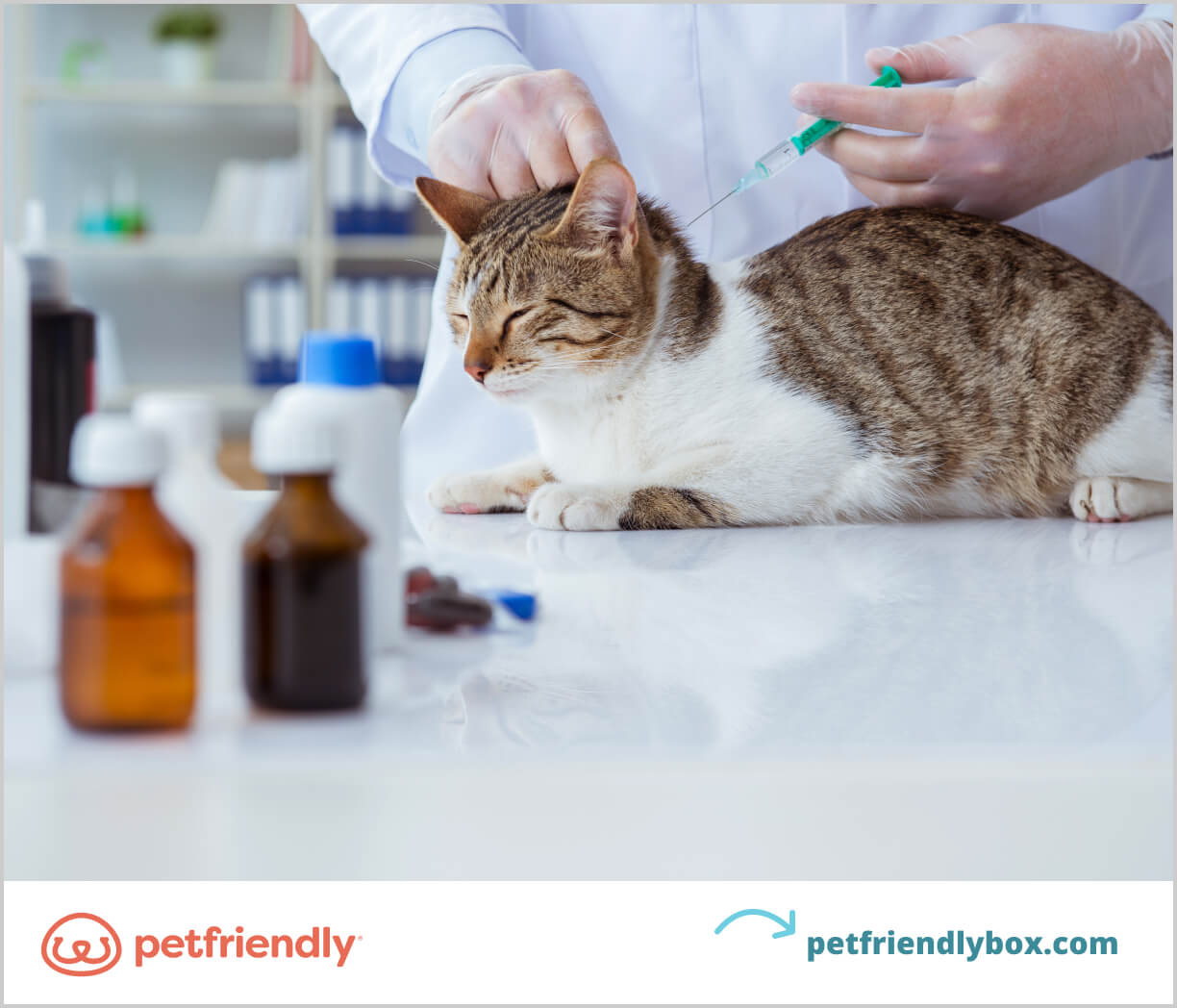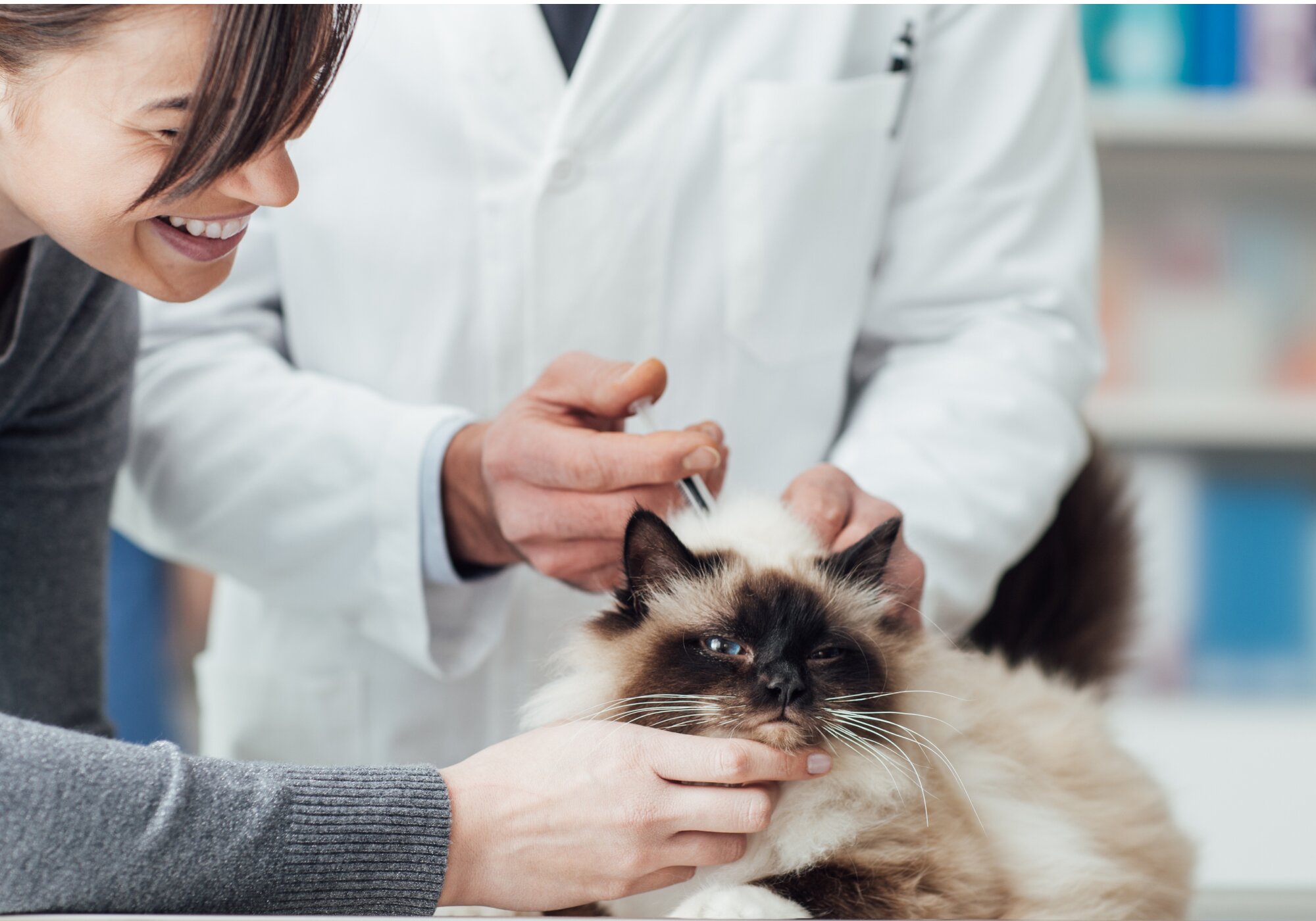One of the best ways to take care of your cat and prevent unwanted health problems and vet bills is through cat vaccinations. Most cats require vaccines. This includes indoor cats, outdoor felines, kittens, and adult cats.
Depending on your cat's lifestyle, they may need a few different types. But, what vaccines does your cat need and what's an appropriate vaccination schedule for cat owners to follow?
In this article, we'll cover:
- The importance of cat vaccinations
- How often do cats need vaccines
- Types of cat vaccines

The importance of vaccines for cats
Cat vaccinations are vital to your pet's health. They prevent infectious diseases and reduce the risk of your cat becoming sick.
Vaccines are a safe and effective way to protect cats from disease by helping them develop immunity against specific viruses or bacteria that cause illness. And, vaccines are a good investment in your cat's health.
Here are some of the many reasons that you should vaccinate your cat:
- To protect against infectious disease
- To improve the quality of life for your cat
- To prevent illness or death
How often do cats need vaccines

It's important to remember that cats need to be vaccinated regularly. Getting your cat on a recurring vaccination schedule will help you keep track of your cat's health.
Kitten vaccination schedule
Kitten vaccinations begin when your feline is 6 to 8 weeks old. Immunizations are usually given in three doses every 3-4 weeks until your cat is 4 months old. This schedule should be followed every year unless otherwise advised by your vet.
Here are the initial vaccinations your kitten will need first:
- Feline calicivirus (FCV) vaccine
- Feline leukemia (FeLV) vaccine
- Feline panleukopenia (FLP) or feline distemper/parvovirus
- Feline viral rhinotracheitis (FVR) or feline herpesvirus type-1 (FHV-1)
- Rabies vaccinations (required by law)
Adult cat vaccination schedule
By 16 weeks old your cat's vaccine schedule will primarily be an annual rabies shot. But, your veterinarian may also recommend vaccinations for feline leukemia virus, bordetella, and distemper (combination vaccine protection).
After that, your cat's vaccinations will be determined by their exposure to these diseases in your area or other medical conditions such as pregnancy.
Types of vaccines cats need

There are a variety of cat vaccinations your feline will need in their lifetime. The two types are core and non-core vaccinations.
Core vaccines for cats
Core vaccinations protect your cat from infectious diseases that can spread to other cats or people. So, it's important to keep them up-to-date on these with annual booster shots.
The American Association of Feline Practitioners (AAFP) and AAHA recommend these core vaccines.
FVRCP
Often referred to as a feline distemper shot, this combination vaccine protects your cat from these oral, viral infections. These three viruses (FVRCP) are the most common causes of upper respiratory tract infections in cats.
Feline viral rhinotracheitis
VR represents feline viral rhinotracheitis which is caused by feline herpes virus type-1. It is the most common cause of upper respiratory infections in cats.
Feline calicivirus
The C is represented by calicivirus — a highly contagious virus with mild respiratory side effects. It causes 50% of cat respiratory infections.
Feline panleukopenia
Finally, the P stands for panleukopenia. This infection is caused by feline parvovirus. Your vet may recommend a distemper shot* to protect your cat.
*Periodic booster shots of distemper are recommended — follow veterinarian's advice.
Rabies vaccine
Rabies is a viral infection that affects the central nervous system. It is a fatal disease that can be transmitted to humans through a bite or scratch from an infected animal. You should contact your veterinarian immediately if your cat gets bit by a wild animal.
The rabies vaccine is a core vaccine that is highly recommended for cats living in high-risk areas. It is typically required by law in most states for domestic animals. Booster shots of this cat vaccine are needed every three years.
Non-core vaccines for cats
There are some cat vaccines that aren't considered essential but could be helpful in preventing disease and bacterial infection. These are called non-core or lifestyle vaccines.
These vaccines protect against specific diseases that aren't as contagious or life-threatening as the more common ones. But, they are great options to consider depending on your cat's environment or geographic location.
Bordetella
Bordetella (kennel cough) is a contagious bacterial disease that may infect cats' upper respiratory tract. Many cats experience minor symptoms that resolve in a few days.
Your doctor of veterinary medicine (DVM) may recommend this cat vaccine, especially if you have other pets. Disease exposure is common among indoor cats in kennels, shelters, and multiple pet homes.
Feline chlamydiosis
Chlamydiosis is a bacteria-based respiratory infection. The most common symptoms include watery eyes, sneezing, and difficulty breathing. If you have an indoor cat who stays at a kennel or boarding facility this is a good vaccine to ask your vet about.
Feline leukemia virus (FeLV)
Feline leukemia is a disease that affects your cat's immune system and increases your cat's risk of contracting other illnesses. Your cat's first feline leukemia vaccine occurs around 8 weeks old.
The feline leukemia vaccine is recommended for outdoor cats. But, it's also important to keep your indoor cat vaccinated if they visit a boarding kennel often because it spreads via saliva from cat to cat.
Feline infectious peritonitis (FIP)
Feline infectious peritonitis is a viral disease that shows up in the gastrointestinal tract. Strains of this virus can mutate and develop into life-threatening diseases that can be fatal without treatment.
Younger cats are the most susceptible but purebred cats, males, and geriatric cats also show a higher likelihood of contracting FIP.
Feline hepatitis
Hepatitis in cats is a liver disorder caused by parasitic diseases. There are two forms of hepatitis and each has its own symptoms. The main signs to look for include lethargy, vomiting, and decreased appetite.
Feline immunodeficiency virus (FIV)
Unfortunately, there isn't a vaccine for the feline immunodeficiency virus. So, it's best to keep infected cats away and ensure your cat receives appropriate testing. This usually involves a blood test to detect antibodies.

If you're unsure about what kitten vaccinations to start with, your vet can be a great resource. They can give you general guidelines for when your cat should get a vaccine and keep track of your cat's vaccination history for future reference.
At your next cat check-up, ask your vet about vaccinations, flea control, and heartworm to keep your cat stay healthy year-round.

